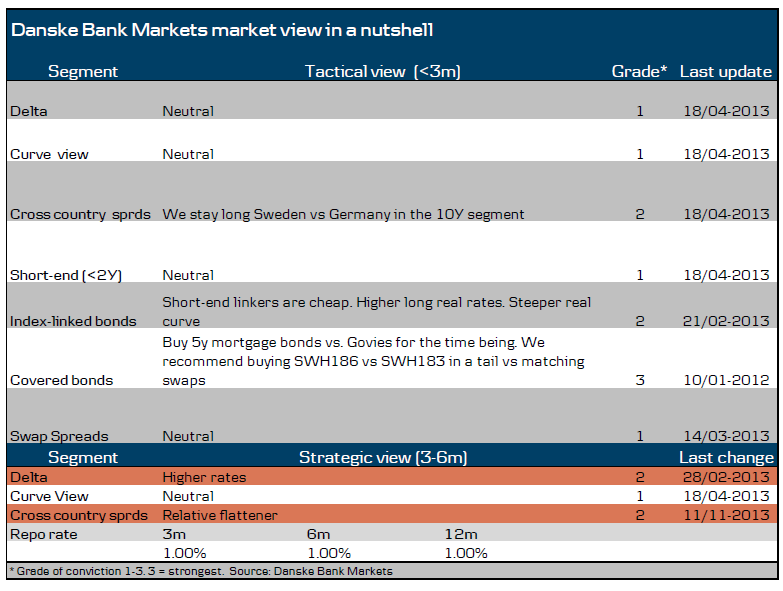The Riksbank's dilemma is that the repo rate that stabilises household debt is not the same as the rate that fulfils the inflation target.
There is a risk of accelerating household credit growth in March. We also count on lower unemployment in March, which should confirm the declining trend since November.
In a comment yesterday we explained why we completely misread the Riksbank and we see no reason to go through all that again. However, of course we need to have an opinion about monetary policy also in the future, therefore some observations are worth mentioning.
The adjustment of the policy rate path yesterday is among the largest between two meetings ever. As we pointed out, the (main) reason behind this revision is not that the Riksbank has altered its view on fundamental variables such as global and Swedish growth, costs etc – they are almost unchanged. Instead, based on recent years’ experiences, the Riksbank has re-estimated the inflation elasticity of costs over the medium term. In other words, the Riksbank now expects ULC to affect inflation to a lesser extent than previously assumed. In a way, this means that the Riksbank in recent years has systematically overestimated inflation and hence conducted austere monetary policy, one could say.
This is a truly fundamental change that explains the significant shift in the response function (the repo rate path). Doing some back trading one could possibly (but only possibly) have suspected that something like this was in pipeline given that the Bank of Norway in the latest (March) monetary policy report did exactly the same thing. Nevertheless, this is the way it is and it appears logical to believe that the result actually will be policy on hold for a much longer period than we thought – we continue to believe that unchanged rates are a higher probability than a cut.
Then there is the issue of household debt. We find that communication from the Riksbank is becoming almost bizarre. We do not understand how continuous remarks from Ingves and others about how concerned they are fits in with the new forecast, which simply says that the Riksbank expects debt-to-income to rise further in coming years.
To Read the Entire Report Please Click on the pdf File Below.
- English (UK)
- English (India)
- English (Canada)
- English (Australia)
- English (South Africa)
- English (Philippines)
- English (Nigeria)
- Deutsch
- Español (España)
- Español (México)
- Français
- Italiano
- Nederlands
- Português (Portugal)
- Polski
- Português (Brasil)
- Русский
- Türkçe
- العربية
- Ελληνικά
- Svenska
- Suomi
- עברית
- 日本語
- 한국어
- 简体中文
- 繁體中文
- Bahasa Indonesia
- Bahasa Melayu
- ไทย
- Tiếng Việt
- हिंदी
Sweden: Reading The Markets
Published 04/19/2013, 08:05 AM
Updated 05/14/2017, 06:45 AM
Sweden: Reading The Markets
Latest comments
Loading next article…
Install Our App
Risk Disclosure: Trading in financial instruments and/or cryptocurrencies involves high risks including the risk of losing some, or all, of your investment amount, and may not be suitable for all investors. Prices of cryptocurrencies are extremely volatile and may be affected by external factors such as financial, regulatory or political events. Trading on margin increases the financial risks.
Before deciding to trade in financial instrument or cryptocurrencies you should be fully informed of the risks and costs associated with trading the financial markets, carefully consider your investment objectives, level of experience, and risk appetite, and seek professional advice where needed.
Fusion Media would like to remind you that the data contained in this website is not necessarily real-time nor accurate. The data and prices on the website are not necessarily provided by any market or exchange, but may be provided by market makers, and so prices may not be accurate and may differ from the actual price at any given market, meaning prices are indicative and not appropriate for trading purposes. Fusion Media and any provider of the data contained in this website will not accept liability for any loss or damage as a result of your trading, or your reliance on the information contained within this website.
It is prohibited to use, store, reproduce, display, modify, transmit or distribute the data contained in this website without the explicit prior written permission of Fusion Media and/or the data provider. All intellectual property rights are reserved by the providers and/or the exchange providing the data contained in this website.
Fusion Media may be compensated by the advertisers that appear on the website, based on your interaction with the advertisements or advertisers.
Before deciding to trade in financial instrument or cryptocurrencies you should be fully informed of the risks and costs associated with trading the financial markets, carefully consider your investment objectives, level of experience, and risk appetite, and seek professional advice where needed.
Fusion Media would like to remind you that the data contained in this website is not necessarily real-time nor accurate. The data and prices on the website are not necessarily provided by any market or exchange, but may be provided by market makers, and so prices may not be accurate and may differ from the actual price at any given market, meaning prices are indicative and not appropriate for trading purposes. Fusion Media and any provider of the data contained in this website will not accept liability for any loss or damage as a result of your trading, or your reliance on the information contained within this website.
It is prohibited to use, store, reproduce, display, modify, transmit or distribute the data contained in this website without the explicit prior written permission of Fusion Media and/or the data provider. All intellectual property rights are reserved by the providers and/or the exchange providing the data contained in this website.
Fusion Media may be compensated by the advertisers that appear on the website, based on your interaction with the advertisements or advertisers.
© 2007-2025 - Fusion Media Limited. All Rights Reserved.
